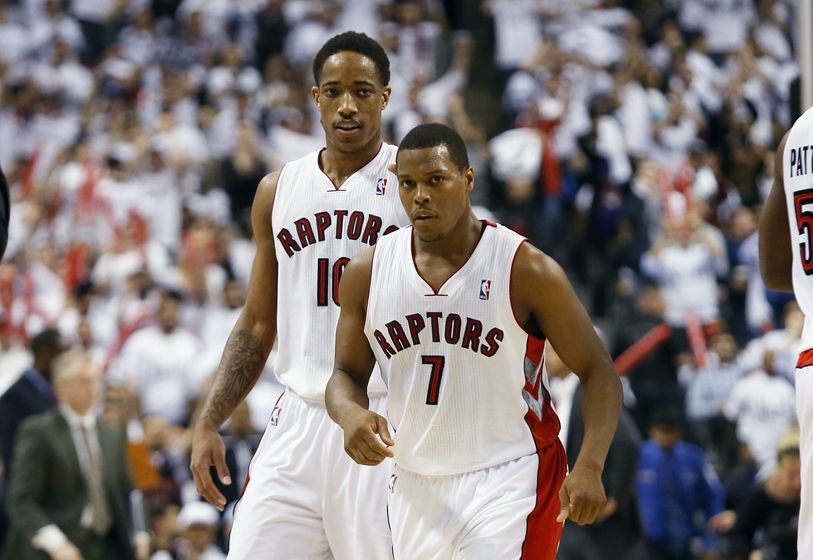When people think of arrogance they are immediately filled with images of people with an outsized ego forcing their will on everyone around them. They think of people with a fundamental lack of empathy, of people closed-off to opinions other than their own and of people with their chests puffed out and voices that dominate everyone in the room.
There are subtler forms of arrogance, though, and they can be far more pervasive if they are allowed to seep through the bloodstream of a closed-off group of individuals like, say, a professional basketball team.
The Toronto Raptors are an arrogant bunch. They aren’t arrogant in an interpersonal way — the Raptors are a mostly congenial group that get along well together and support each other — but as a basketball team they are one of the most arrogant groups Toronto has ever fielded.
Up and down the roster and through the coaching ranks, arrogance has been a defining characteristic of this club all season long. This team plays arrogant basketball. They play the game like they know something that no one else does, and they do it despite their near total lack of practical accomplishments. They force one-on-one offence even when defences suck the oxygen out of their free space. They refuse to box-out despite getting routinely manhandled on the glass. They reach against penetrating guards rather than moving their feet, which allows any halfway decent player to have a career-night against Toronto’s half-hearted stoppers.
During the regular season, the players sloughed off these inadequacies by implying that they were always one win away from turning it around or that once the Playoffs started none of this would even matter. They felt they were above their own inadequacies, or that they simply didn’t represent them like their self-perceived strengths did. They barely managed a .500 record after January 1st were a sub-.500 team after the All-Star break, and yet they continued to arrogantly assert that nothing was wrong. They continued to play in a way that demonstrated a total lack of understanding as to why they were losing so many games, and now that they Playoffs have arrived, that arrogance is making them look like they don’t even belong on the same court as their opponents. Their total (admitted) lack of urgency Tuesday night in a must-win game two contest speaks to the depths of their arrogance, with the roster figuring they could just show up and play as if they were playing some random game in February, not the most important game of their season.
On Tuesday night, Washington looked like a Playoff team. Their best player, John Wall, was utterly dominant, his supporting cast executed the team’s game plan to perfection, especially on the defensive end, and they routinely pounded Toronto in all of the ways a scouting report would have suggested that they should. The Raptors, meanwhile, looked like an over-matched scrimmage opponent. They haphazardly threw themselves at Washington, insisting on going one-on-one against the NBA’s fifth-best defence, they refused to box out despite getting pounded on the boards (again) and five players had four-or-more fouls because everyone would rather reach and grab than move their feet on defence. It takes a colossal amount of arrogance to continue to play like that while 20, 000 people are watching you get embarrassed, but that’s these Raptors, arrogantly refusing to alter their style of play in the face of all reasonable logic.
You could excuse some of this if a) this was this group’s first trip to the Playoffs or b) if the Wizards had one or two superstars that simply defied any attempts at game-planning against them. Neither of those things are true, however. Last year was supposed to demonstrate how they have to conduct themselves in the postseason so that they’d be ready this year, that was what cushioned the blow of losing to a lower-seeded team. Washington has exactly one All-Star level talent (to Toronto’s two) and the regular season sweep of the club would suggest that Toronto has the personnel to at least put up a fight.
That’s what arrogance robs you of, though. It robs you of the ability to maximize lessons learned. It hardens you against outside influence. It reenforces the echo chamber in the locker room that everything is fine and that they are one game away from turning it around. It’s what lets Paul Pierce taunt DeMar DeRozan into distraction on the eve of the postseason. It’s what lets Kyle Lowry stubbornly refuse to acknowledge the way the refs are calling these games, getting himself into dire foul trouble in both contests. It’s what allows Dwane Casey steadfastly stick to the strategy on the pregame whiteboard rather than adjust to the realities of what is happening on the court. It’s what allows Jonas Valanciunas to think demonstrating frustration is more important than moving on to the next play. It’s what allows Lou Williams to treat a double-team like it’s a dare. It’s what allows the entire roster to act like getting back on defence is beneath them. It’s what allows a division champion to lose two games at home, effectively ending their season four days into the postseason.
All year long we’ve watched this team act like they’ve accomplished something that they haven’t. We’ve watched them turn up their noses at the thought that they might not be as good as they think they are, or that they might have to work harder to get to where they think they deserve to go. If that’s the attitude that they decide to maintain, the Playoff motto will tell them where they actually deserve to go.
Win or Go Home.



